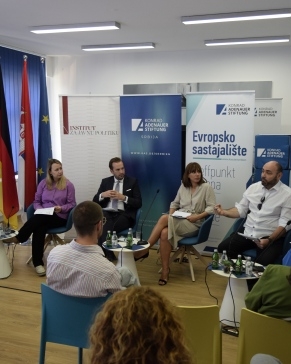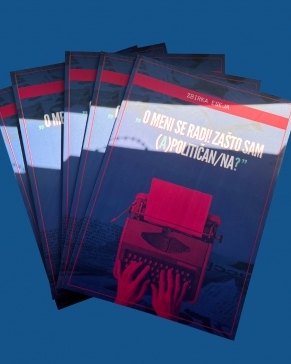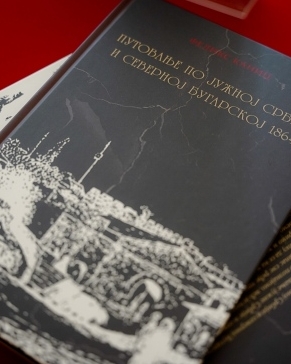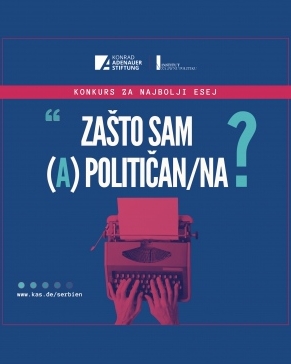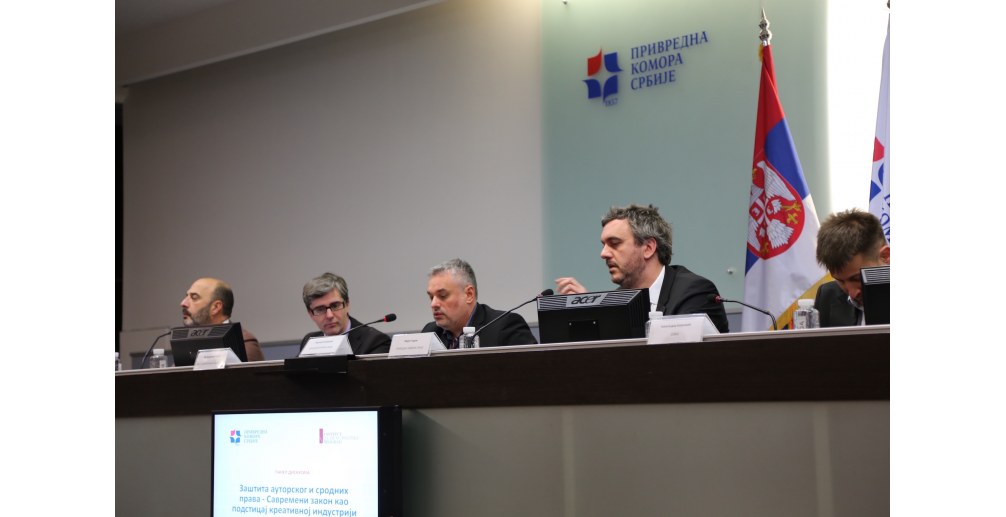
Panel discussion organized by Chamber of Commerce and Industry of Serbia and Public Policy Institute titled “Protection of copyright and related rights – CONTEMPORARY LAW AS A STIMULUS TO CREATIVE INDUSTRY” has been held today in Chamber of Commerce and Industry of Serbia (CCIS).
Keynote speaker and moderator was Secretary General of the Union of Discographers of Serbia Rodoljub Stojanović, while participants were president of CCIS Marko Čadež, assistant of Minister of Education, Science and Technological Development prof. dr Branko Bugarski, assistant of Director of Serbia’s Intellectual Property Office Vladimir Marić, director of Serbian Music Authors’ Organization SOKOJ Aleksandar Kovačević, member of the board of directors of Organization of Phonogram Producers of Serbia OFPS Slobodan Nešović, member of the legal team of the Association of Independent Electronic Media ANEM Miloš Stojković, and librarian-advisor in National Library of Serbia dr Dragana Milunović.

The common conclusion by panel’s participants was that the level of protection of intellectual property in Serbia has been reduced by previous inadequate changing of regulations, which now makes it necessary to urgently change the Law on copyright and related rights. They had an objection to the fact that the public debate was held two years ago, in December 2013, while the regulation has not yet been enacted.
The president of CCIS Marko Čadež has pointed out that by enacting the amended law, which is in procedure, would remove objections held by European Commission, which are, at the same time, shared by the domestic experts.
“European Commission has warned that the last changes of the Law on copyright and related rights from 2012 are not in accordance with EU legislation and international conventions”, Čadež has said. In EC’s opinion, former changes have led to decrease of the level of protection of intellectual capital, they have significantly limited author’s rights and they have led to discrimination of economic subjects and have threatened the principle of equal legal status on the market, Čadež has asserted. “The experts’ opinion is that maintaining such solutions would jeopardize the process of European integration and prevent Serbia's membership in the World Trade Organization”, Čadež has warned. He pointed out that special attention should be devoted to the protection of intellectual property and fighting piracy, indicating the increased significance and influence of industry based on copyright and related rights on economy of Serbia; their share of GDP and export is becoming increasingly significant.
“The participation of key industries based on copyright and related rights in GDP has exceeded 3%, according to the latest data”, Čadež has pointed out.
Director of the Serbian Music Authors’ Organization (SOKOJ) Aleksandar Kovačević has said that “two completely unbelievable things” were done by amendments to the law in 2012 - a limit was imposed on the compensation payable to the organizations and some categories were exempted of the obligation to pay royalties. Kovačević noted that the aim to protect socially vunerable categories has failed, because now, for example, beauty salons are exempted because they are classified as craft shops, which represents a direct violation of the principle of equality of economic entities in the market.
Member of the board of directors of Organization of Phonogram Producers of Serbia (OFPS) Slobodan Nešović pointed out that investors in creative industry must be protected as any other investors that come to Serbia. He said that this branch doesn’t demand the investment of billions, and yet it creates economic growth and employment. He also added that Serbia represents a creative power in the region, and that fact isn’t sufficiently used.
Member of the legal team of the Association of Independent Electronic Media (ANEM) Miloš Stojković has spoken about experiences from negotiations between rightholders and users, about positive practice, but also about the problems caused by existing legal frame. Stojković has pointed out that by hard work and professionalism of all participants in the process, the balance between protection of copyright and protection of media freedom and public interest has been successfully made.
Librarian-advisor in the National Library of Serbia dr Dragana Milunović has remarked upon knowledge and implementation of regulations in the field of intellectual property protection in libraries of Serbia, on availability of creative work and usage of open standards in science, education and culture, as well as the commitment of the National Library of Serbia to open science. She pointed out that National Library of Serbia has very rich digital books archive, and that currently the efforts are under way to make it accessible to the public, respecting the copyright of the authors.
Assistant of the Minister of Education, Science and Technological Development prof. dr Branko Bugarski has said that only economy founded on knowledge and innovations can be competitive on the world market.

“In order to provide incentive to innovators and creative industry as a whole, we must be sure that the rights of all participants in the process are protected. Modern law on copyright and related rights is necessary and the state makes efforts in this area”, Bugarski has added.
Assistant of the director of Serbia’s Intellectual Property Office Vladimir Marić has pointed out that the new draft of the Law on copyright and related rights, which is in procedure, removes defects caused by previous changes of regulations. Thus our legal framework will be significantly closer to European Union legislation, it will be possible to better protect intellectual capital, which will give a boost to the local creative industry. Marić has added that contribution of industries founded on copyright and related rights to the economy of Serbia is very significant. It amounts to 3,1% of GDP, while, for comparison, the financial services sector contributes with 3,2%, and electricity generation sector contributes with 3,3% of GDP of Serbia. “Activities founded on copyright and related rights participate in the overall employment of the Republic of Serbia with 2.6% and employ about 58,000 workers. These industries have higher productivity and have overcome the crisis better than the rest of Serbian economy”, Marić has said.
Considering that the development of creative industry is crucial for authors’ ability to charge economic value of their work, the significance of resolute fight against piracy has been pointed out at the discussion. Bearing in mind that the states that fight against piracy most effectively are the states with most successful economies, CCIS and Public Policy Institute encourage the public dialogue regarding piracy, and warn that the active participation of the state, companies, Prosecution’s office for high-tech crime and Serbian Ministry of Internal Affairs’ special units for combating high-tech crime is needed for economic sustainability of creative industry.

